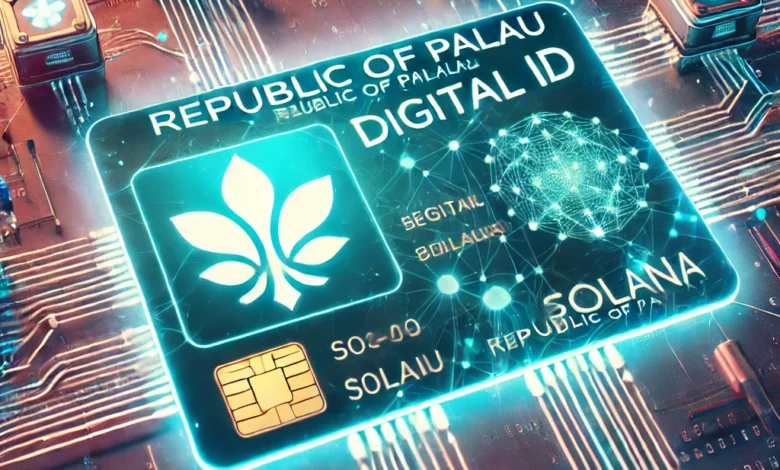Digital IDs for Palau on Solana: A Blockchain Revolution

In a significant development for both the blockchain industry and the Republic of Palau, the island nation has started issuing digital IDs on the Solana blockchain. This initiative marks a pioneering step in leveraging blockchain technology to enhance identity verification, offering a glimpse into the future of digital identification. This article delves into the details of this groundbreaking project, its implications, and its potential impact on global digital identity solutions.
The Republic of Palau’s Digital ID Initiative
Background and Motivation
The Republic of Palau, a small island nation in the western Pacific Ocean, is known for its forward-thinking approach to technology and governance. Recognizing the growing importance of digital identity in a globalized world, Palau has embarked on a mission to provide its citizens and residents with secure, verifiable digital IDs. This initiative is part of a broader strategy to modernize the country’s administrative infrastructure and integrate cutting-edge technologies into everyday life.
Why Solana?
The decision to use the Solana blockchain for this project is noteworthy. Solana is renowned for its high performance, scalability, and low transaction costs. These features make it an ideal platform for a digital ID system that needs to be both efficient and secure. Solana’s blockchain can handle thousands of transactions per second, ensuring that the digital ID system remains robust even as the number of users grows.
How the Digital ID System Works
Issuance and Verification
The process of obtaining a digital ID on Solana is straightforward. Citizens and residents of Palau can apply for their digital IDs through a secure online portal. The application process involves verifying personal information and submitting necessary documentation. Once approved, the digital ID is issued and recorded on the Solana blockchain.
The digital ID includes essential personal information, encrypted to ensure privacy and security. The use of blockchain technology guarantees that the data is immutable and tamper-proof, providing a high level of trust and reliability.
Benefits of Blockchain-Based IDs
- Security: Blockchain’s decentralized nature makes it highly secure against hacking and data breaches. The encrypted information stored on the blockchain is virtually impossible to alter or delete without proper authorization.
- Accessibility: Digital IDs on the Solana blockchain can be accessed from anywhere in the world, making it easier for Palauan citizens and residents to verify their identities when traveling or conducting international transactions.
- Efficiency: The automated processes enabled by blockchain reduce the time and resources required for identity verification. This efficiency can streamline various administrative tasks, from opening bank accounts to accessing government services.
- Transparency: The transparency of blockchain technology ensures that all transactions and changes to the digital IDs are publicly recorded and verifiable. This transparency fosters trust between the government and its citizens.
Implications for the Global Digital Identity Landscape
A Model for Other Nations
Palau’s digital ID initiative sets a precedent for other countries considering blockchain-based identity solutions. By demonstrating the practicality and benefits of this technology, Palau serves as a model for how nations can leverage blockchain to enhance their identity verification systems.
Enhancing Financial Inclusion
One of the significant challenges in many developing countries is the lack of formal identity documentation, which can hinder access to financial services. Blockchain-based digital IDs can provide a secure and verifiable means of identification, promoting financial inclusion for underserved populations. This technology can help bridge the gap between traditional banking and the unbanked, offering new opportunities for economic growth and development.
Privacy and Data Protection
The use of blockchain for digital IDs raises important questions about privacy and data protection. While blockchain offers high security, it also requires careful consideration of how personal data is managed. Palau’s approach includes encryption and strict access controls to ensure that individuals’ privacy is respected. This model can inspire similar privacy-focused solutions in other jurisdictions.
Challenges and Considerations
Technological Barriers
Implementing a blockchain-based digital ID system requires significant technological infrastructure and expertise. Ensuring the system’s reliability and security is paramount, and any technical failures could undermine trust in the system. Palau’s partnership with Solana highlights the importance of selecting a robust and reliable blockchain platform.
Legal and Regulatory Issues
The legal and regulatory landscape for digital IDs is still evolving. Countries adopting blockchain-based identity solutions must navigate complex legal frameworks to ensure compliance with national and international regulations. Palau’s experience can provide valuable insights into addressing these legal challenges.
Public Acceptance
For any digital ID system to succeed, it must gain public acceptance and trust. Educating citizens about the benefits and security of blockchain-based IDs is crucial. Palau’s government has engaged in extensive public outreach to ensure that its citizens understand and embrace the new system.
The Future of Digital Identity
Integration with Other Technologies
The integration of digital IDs with other emerging technologies, such as artificial intelligence and the Internet of Things (IoT), holds exciting possibilities. For example, AI can enhance the verification process, while IoT devices can use digital IDs for secure interactions. The synergy between these technologies can create more advanced and secure digital ecosystems.
Global Standards
As more countries explore blockchain-based digital ID systems, the need for global standards becomes apparent. Standardizing digital identity protocols can facilitate international cooperation and interoperability, making it easier for individuals to use their digital IDs across borders. Palau’s initiative contributes to the growing body of knowledge that can inform the development of these global standards.
Continuous Innovation
The field of digital identity is rapidly evolving, with new innovations and improvements emerging regularly. Continuous research and development are essential to keep pace with technological advancements and address emerging challenges. Palau’s commitment to innovation positions it as a leader in the digital identity space.
The Republic of Palau’s adoption of digital IDs on the Solana blockchain represents a significant milestone in the evolution of digital identity solutions. This initiative not only enhances the security and efficiency of identity verification for Palauan citizens and residents but also sets an example for other nations. As blockchain technology continues to advance, the integration of digital IDs with other emerging technologies promises to revolutionize how we manage and verify identities globally. By addressing challenges and embracing innovation, Palau is paving the way for a more secure and connected digital future.




